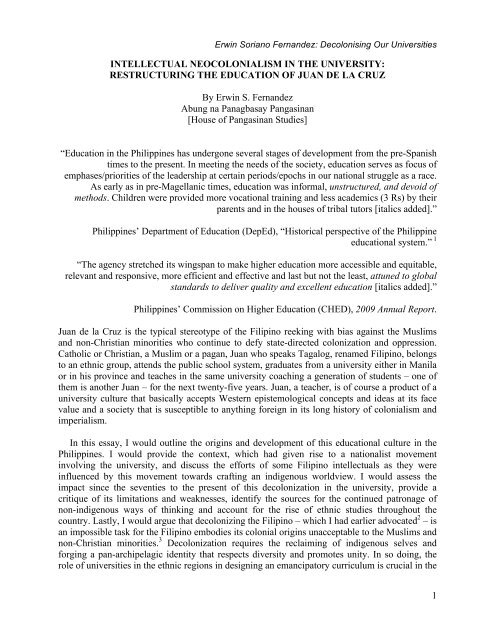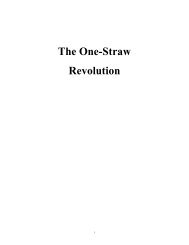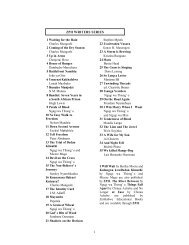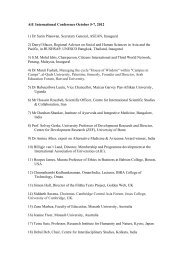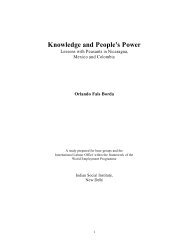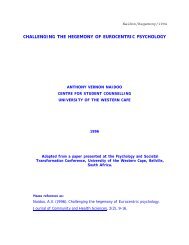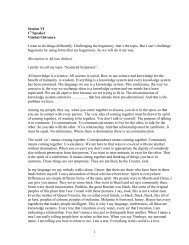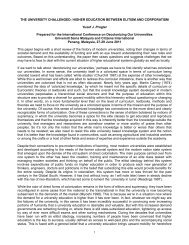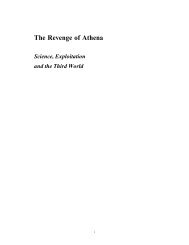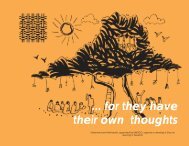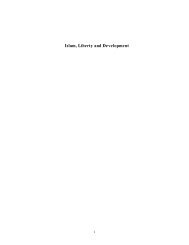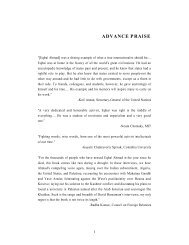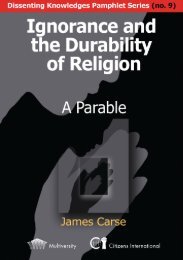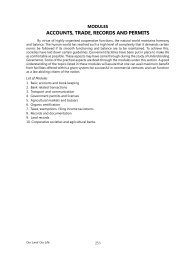1 INTELLECTUAL NEOCOLONIALISM IN THE ... - Multiworld India
1 INTELLECTUAL NEOCOLONIALISM IN THE ... - Multiworld India
1 INTELLECTUAL NEOCOLONIALISM IN THE ... - Multiworld India
Create successful ePaper yourself
Turn your PDF publications into a flip-book with our unique Google optimized e-Paper software.
Erwin Soriano Fernandez: Decolonising Our Universities<br />
<strong><strong>IN</strong>TELLECTUAL</strong> <strong>NEOCOLONIALISM</strong> <strong>IN</strong> <strong>THE</strong> UNIVERSITY:<br />
RESTRUCTUR<strong>IN</strong>G <strong>THE</strong> EDUCATION OF JUAN DE LA CRUZ<br />
By Erwin S. Fernandez<br />
Abung na Panagbasay Pangasinan<br />
[House of Pangasinan Studies]<br />
“Education in the Philippines has undergone several stages of development from the pre-Spanish<br />
times to the present. In meeting the needs of the society, education serves as focus of<br />
emphases/priorities of the leadership at certain periods/epochs in our national struggle as a race.<br />
As early as in pre-Magellanic times, education was informal, unstructured, and devoid of<br />
methods. Children were provided more vocational training and less academics (3 Rs) by their<br />
parents and in the houses of tribal tutors [italics added].”<br />
Philippines’ Department of Education (DepEd), “Historical perspective of the Philippine<br />
educational system.” 1<br />
“The agency stretched its wingspan to make higher education more accessible and equitable,<br />
relevant and responsive, more efficient and effective and last but not the least, attuned to global<br />
standards to deliver quality and excellent education [italics added].”<br />
Philippines’ Commission on Higher Education (CHED), 2009 Annual Report.<br />
Juan de la Cruz is the typical stereotype of the Filipino reeking with bias against the Muslims<br />
and non-Christian minorities who continue to defy state-directed colonization and oppression.<br />
Catholic or Christian, a Muslim or a pagan, Juan who speaks Tagalog, renamed Filipino, belongs<br />
to an ethnic group, attends the public school system, graduates from a university either in Manila<br />
or in his province and teaches in the same university coaching a generation of students – one of<br />
them is another Juan – for the next twenty-five years. Juan, a teacher, is of course a product of a<br />
university culture that basically accepts Western epistemological concepts and ideas at its face<br />
value and a society that is susceptible to anything foreign in its long history of colonialism and<br />
imperialism.<br />
In this essay, I would outline the origins and development of this educational culture in the<br />
Philippines. I would provide the context, which had given rise to a nationalist movement<br />
involving the university, and discuss the efforts of some Filipino intellectuals as they were<br />
influenced by this movement towards crafting an indigenous worldview. I would assess the<br />
impact since the seventies to the present of this decolonization in the university, provide a<br />
critique of its limitations and weaknesses, identify the sources for the continued patronage of<br />
non-indigenous ways of thinking and account for the rise of ethnic studies throughout the<br />
country. Lastly, I would argue that decolonizing the Filipino – which I had earlier advocated 2 – is<br />
an impossible task for the Filipino embodies its colonial origins unacceptable to the Muslims and<br />
non-Christian minorities. 3 Decolonization requires the reclaiming of indigenous selves and<br />
forging a pan-archipelagic identity that respects diversity and promotes unity. In so doing, the<br />
role of universities in the ethnic regions in designing an emancipatory curriculum is crucial in the<br />
1
Erwin Soriano Fernandez: Decolonising Our Universities<br />
production of indigenous knowledge systems and their collection and dissemination as the<br />
cultural archive of the entire archipelago.<br />
The university and Western epistemological tradition<br />
The origins of Western epistemological tradition can be traced back to the creation and<br />
establishment of universities in Manila inside the walls or Intramuros. In 1611 the University of<br />
Santo Tomas was established as a small college ran by the Dominicans, later elevated to<br />
university in 1645. An earlier institution was the Colegio de Manila, or the Colegio de San<br />
Ignacio erected in 1585 but it ceased to exist when the Jesuits were expelled from the Philippines<br />
in 1768. Courses offered were theology and philosophy, canon law, logic and grammar, arts and<br />
civil law, later pharmacy and medicine in 1871 in the former and theology and the arts, later<br />
canon law and civil law in the latter. 4<br />
Steeped into European, particularly Hispanic intellectual tradition, the missionaries-turnedteachers<br />
were transmitting their acquired learning to few students, mostly Spaniards born in<br />
Spain and in Manila and perhaps a number of Spanish mestizos with Chinese or native descent<br />
living in the capital. Although established in 1620 as secondary institution, the Colegio de San<br />
Juan de Letran could have catered only on its early years to select students, specifically orphans,<br />
from around Manila or nearby regions until 1706. 5 Only the implementation of the educational<br />
decree of 1863 mandating the establishment of primary schools for boys and girls throughout the<br />
country could have changed a little the educational landscape but only a few still, particularly<br />
from the landed and the middle classes, which had lucratively participated in the<br />
commercialization of agriculture, could enter the university, the University of Santo Tomas. 6 By<br />
this time, Ateneo de Manila, from a small primary school for children of Spanish residents,<br />
became a Jesuit secondary institution offering a bachelor’s degree as well as certificate courses<br />
in agriculture, surveying and business. 7<br />
Thus, the university became the training ground for native and non-native scholars and<br />
professionals in various fields under the spell of European and Spanish epistemology. The<br />
generation of Gregorio Sancianco (1852-1897), Trinidad Pardo de Tavera (1857-1925), Pedro<br />
Paterno (1858-1911), Jose Rizal (1861-1896), Isabelo de los Reyes (1864-1938), Apolinario<br />
Mabini (1864-1903) and others turned out specimens for the creation of a corpus of Philippine<br />
knowledge under the aegis of European intellectual theories and practices. 8<br />
The indigenous traditions in the midst of nationalist awakening and re-awakening<br />
While these Filipino intellectuals were churning out treatises, books, monographs on the<br />
Philippines, they were also charting the course of an independent nation. They have to cite works<br />
by European scholars to disprove the prejudiced assumptions made against their race (Rizal’s<br />
Sobre la indolencia de los Filipinos 9 ), to stress their equality with the Spaniards (Sanciangco’s<br />
El Progreso de Filipinas 10 ), to document their ancient civilization as it was connected to a larger<br />
Asia 11 (Rizal’s annotations to Morga 12 , Paterno’s La antigua civilizacion Tagalog 13 , De los<br />
Reyes’ El folklore Filipino 14 , Mabini’s idea of a pan-Malayan identity 15 ) and to demonstrate their<br />
capacity for thinking (Sanciangco’s). The Philippine revolution (1896-1898) upon the<br />
establishment of the first Philippine republic promised the break with Spanish clergy-controlled<br />
2
Erwin Soriano Fernandez: Decolonising Our Universities<br />
curriculum with the creation of the Universidad Cientifica-Literaria de Filipinas. 16 But this<br />
secular university manned by Filipino scholars and intellectuals who graduated from Santo<br />
Tomas and Ateneo would only last from November 1898 to September 1899 because the United<br />
States and the republic were at war since February.<br />
The entry of the U.S. and the subsequent annexation of the Philippines destroyed the republic,<br />
and set in motion a new relationship with another colonial master under the pretext of tutelage,<br />
which had an effect in the direction of Philippine scholarship. The previous regime curtailed the<br />
production of knowledge through censorship. The U.S. guaranteed freedom of the press, and<br />
introduced mass education in English forcing universities and colleges to teach an English-based<br />
curriculum. The University of the Philippines, established in 1908, pioneered in the teaching of<br />
American-based curriculum in all disciplines. Most universities, however, during this period up<br />
to the present, were and are still handled by Catholic missionaries.<br />
In the latter half of the 19 th century, Filipino scholars had to travel to Spain or other European<br />
countries to further their education. In 1903 till 1941 in three phases, under the pensionado<br />
program, Filipino students were provided scholarships to study in colleges and universities in the<br />
U.S. 17 These scholars, studying under American mentors and schooled in American ways of<br />
thinking and feeling, would return to the Philippines to practice what they learned. They would<br />
subsequently become heads of government departments, agencies, and universities or become<br />
politicians affecting national policies.<br />
From claims of equality and assimilation that they aimed for hispanization to claims of<br />
national culture, identity and Asianness of the early generation, Filipinos of this generation,<br />
either intellectuals or the common people, underwent Americanization. There were efforts to<br />
think as a Filipino and understand the Filipino, 18 Filipinize the curriculum, to create and impose<br />
a national language and to develop a national culture in preparation for independence. 19 All these<br />
were momentarily derailed due to the Japanese occupation during the Second World War<br />
although the stirrings for Asian identity had finally taken shape but in the service of propaganda.<br />
By the time independence was recognized in 1946, universities and their curricula exhibited<br />
form and content of the early decades as economic and cultural relations with the US assumed a<br />
new form called neocolonialism. Cooperation between American and Philippine universities<br />
continued. Scholarships from various American foundations supported academic exchanges.<br />
Donations of American books to Philippine libraries intensified. 20 In the midst of these, a<br />
nationalist reawakening erupted in the early and late 1950s led by Senator Claro M. Recto who<br />
questioned the overt American control in Philippine foreign policy and the lack of policy towards<br />
Asia. 21 It continued into the 1960s reaching the halls of the academe when Filipino social<br />
scientists, particularly at the UP Community Development Research Council, recognized the<br />
limitations of Western social science methods to Philippine conditions and the originality of<br />
Filipino culture and tradition. 22 Through the Movement for the Advancement of Nationalism<br />
(MAN), leading nationalists and professors bewailed the Americanization of the state<br />
university. 23 They challenged the deliberate use of American social science models in explaining<br />
Philippine social reality and probed the unsuspecting acceptance of American aids through<br />
scholarships and grants, the Filipino scholar becoming obligated to the funding agencies.<br />
3
Erwin Soriano Fernandez: Decolonising Our Universities<br />
This context would help explain the rise of indigenization movement in the academe<br />
alongside ultra-nationalism in the early 1970s at the height of student activism, communist<br />
insurgency, Moro secessionism and martial law in the country. The continued use of English had<br />
been deplored in the late 1950s and the re-writing of Philippine history from the point of view of<br />
the colonized had begun in late 1940s and sustained in early 1960s till the 1990s. 24 The<br />
reorientation of the Philippines towards Asia got a boost with the creation of the Institute of<br />
Asian studies in mid-1950s at the UP College of Liberal Arts, later to be called the “Asian<br />
Center.” 25 With the imposition of Tagalog, renamed Pilipino in the 1973 Philippine constitution,<br />
indigenous knowledge came to mean studying and understanding the Filipino in the national<br />
language. Thus, the Sikolohiyang Pilipino was conceptualized in the early 1970s and formalized<br />
in 1975 to understand Filipino indigenous psychology, followed by Pilipinolohiya in 1989 and<br />
Pantayong Pananaw, which were further refined in terms of meaning and substance in the early<br />
1990s. 26 These were partly in reaction to studies undertaken by the Institute of Philippine Culture<br />
(IPC) at the Ateneo de Manila in the early 1960s on the realm of Philippine values basically seen<br />
as outsiders’ or American point of view 27 and the discipline called “Philippine Studies”<br />
established in 1974 at UP College of Arts and Sciences whose origins can be traced to studies<br />
made by American colonial scholars on their new colony and developed into “area studies” after<br />
the war as well as to the growing clamors for indigenization in Asia. 28 Outside UP during the<br />
1970s up to the 1990s, there were efforts to indigenize Filipino philosophy and theology. 29 One<br />
author even has found justification to Filipinos’ authoritarian tendency in supposed Filipino<br />
philosophical moorings. 30<br />
Sikolohiyang Pilipino aims to search and develop indigenous ways of knowing and<br />
understanding the Filipino psychology in contrast with the mainstream Philippine psychology,<br />
which is basically Western and American-oriented psychology. 31 Pilipinolohiya, as defined by<br />
its theoretician, is “the systematic study of Philippine psyche, culture and society” using “one’s<br />
own theory that is apt to the [Filipinos’] thinking, culture and society based on their experience<br />
and perspective.” 32 Pantayong Pananaw envisions a civilizational discourse in<br />
Tagalog/P/Filipino in which Filipinos are in control of the construction, comprehension and<br />
dissemination of knowledge about Filipinos and the world around them. 33<br />
Mono-cultural indigenous knowledge: Impact, limits, and the rise of ethnic studies<br />
The rise of this indigenization movement in the academe coincided with the growing threats to<br />
the stability of Philippine nation-state, which had to confront the armed resistance by the<br />
communists, and the Moros. The imposition of Pilipino as the national language and the<br />
suspension of the teaching of the other languages in their respective regions in 1974 were made<br />
to ensure unity at the expense of diversity. The nationalism of the new presidential<br />
administration in 1965 and the growing resentment against English had reconfigured the division<br />
of humanities at UP when a new department in 1966 was created, the Department of Pilipino and<br />
Philippine Literature. The move incurred the opposition from non-Tagalogs primarily and<br />
ironically by the first chairman who had to include in the curriculum of courses the study of non-<br />
Tagalog languages and literatures meeting undue resistance from rabid Tagalog, Pilipino<br />
nationalists. 34 By the 1970s, this ultra-nationalism from UP began to infect other universities<br />
around Manila through the establishment of their own departments of Pilipino and the<br />
institutionalization of degrees in Pilipino, later Filipino after the 1986 Philippine constitution. 35<br />
4
Erwin Soriano Fernandez: Decolonising Our Universities<br />
There are limited gains in the dissemination of this mono-cultural indigenization at UP<br />
because it had slowly influenced other major universities primarily around Manila and nearby<br />
areas. More important factor in its reception is the teaching of Pilipino, later Filipino as medium<br />
of instruction along with English since 1974. 36 Its conduits are organizations with their annual<br />
conferences. Its influence had reached the provinces through memberships. There are<br />
publications done but still limited in circulation. Sikolohiyang Pilipino practitioners instituted an<br />
undergraduate course on Filipino psychology at UP in 1978, the first to do so, and then in the<br />
following years, a PhD with concentration on Philippine psychology was made. 37 In 2004 a<br />
conference, book-launching, film-showing on Filipino personhood was held at UP gathering the<br />
leading lights of the movement. 38 Undergraduate course of Sikolohiyang Pilipino is offered in<br />
non-UP universities such as De la Salle University in Manila. Based on Commission on Higher<br />
Education (CHED) memorandum no. 38 issued on 18 November 2010 on policies and guidelines<br />
for undergraduate programs in psychology, a course on Sikolohiyang Pilipino is offered but as<br />
mere elective. Publication of textbooks in Tagalog on various fields, i.e. aquaculture, biology,<br />
medicine, etc. by the UP Sentro ng Wikang Filipino began in late 1990s. 39 Writing of textbooks<br />
by Filipinos does not automatically mean weaning away from Western concepts although it is a<br />
beginning. In the fields of medicine and nursing, engineering and sciences, foreign authored<br />
textbooks are still the norm in the curriculum. Of course, the teaching of social science courses<br />
as part of the general education as far as UP is concerned is still dominated by Western<br />
epistemological texts and textbooks authored by foreigners. 40<br />
Its slim success has got to do with a number of factors. First, its founders failed to<br />
institutionalize in the university curricula and structure of UP the necessary infrastructure for its<br />
development, sustenance and propagation in terms of personnel, and funding. An institute or a<br />
center of Filipino psychology similar to the Third World Studies Center established in 1977 at<br />
UP could have set the directions needed for Sikolohiyang Pilipino both in theory and practice. It<br />
is worth taking note that alongside this movement, a number of Filipino scholars were engaged<br />
in the discourse of Marxism as an alternative paradigm 41 , which led to the establishment of the<br />
center based on a western construct that the Philippines belonged to the Third World. The hold<br />
of Western epistemology on Filipino academics at UP would explain the logistics and resources<br />
provided for the creation of the center. It is not surprising then that the founders had to establish<br />
on their own independent research centers [i.e., Philippine Psychology Research House (PPRH),<br />
later the Philippine Psychology Research and Training House (PPRTH) or the Bahay Saliksikan<br />
sa Kasaysayan (BAKAS)] for the propagation of their ideas. Second, which is related to the first,<br />
is the resistance from faculty members of a department, and college and university officials who<br />
had doubts about its relevance. Although one founder became dean of a college, another<br />
associate dean, and another, chair of a department – they have succeeded during their terms to<br />
implement the vision they had in mind for their respective fields and disciplines – their success<br />
in realizing their ideas is overturned once their successors took the reins. Last, it can be attributed<br />
to its skewed essentialist perspective on the use of Tagalog as prism of observation and study in<br />
a multi-ethnic, multicultural archipelago like the Philippines, coupled with its slow progress in<br />
articulating theories and their practical application to researches, in the case of Sikolohiyang<br />
Pilipino. 42<br />
The Filipino was and is thus reduced to understanding himself through the national<br />
language. 43 Although the main theoreticians acknowledged the role of ethnic communities in<br />
5
Erwin Soriano Fernandez: Decolonising Our Universities<br />
understanding Filipino culture, they could not see any problem with the use of Tagalog,<br />
Pilipino/Filipino categories in making assumptions about other non-Tagalog cultures. They view<br />
the diverse cultures in the archipelago as having commonalities neglecting the nuances in culture<br />
that each of these ethnic cultures possesses. The richness of the archipelagic cultures in the<br />
hundred ethnicities and languages is never really appreciated and the culture-bearers are taken<br />
for granted, unable to study their own cultures in their own languages in relation to their selves<br />
and to others. The indigenous cannot think and speak in his language; he must speak in another<br />
language under the dictate of another claiming to be his elder brother. Language is a way of<br />
thought. To think in another language other than your own is to deny your ability of thinking in<br />
your own language.<br />
The continued sway of Western epistemology upon Philippine academic practitioners has got<br />
to do with the lack of official policy at the government level, which monitors higher education<br />
institutions. The inadequacy of the tenets of indigenization by its few practitioners due to its<br />
mono-cultural tendency neglecting the other cultures as they are being othered is another factor.<br />
The availability of books by foreign authors in local bookstores nationwide and in local and<br />
national libraries and the open access of materials in the internet provide venues for the<br />
patronage of Western concepts and ideas. There is a lack of definite national policy on<br />
translation of major texts in social science, either by Filipino or foreigners, to the key languages<br />
of the country, which can be explained by the bilingual syndrome, either English or Tagalog, of<br />
policymakers. The effective challenge to Western epistemological tradition is the growing<br />
realization among the different ethnic groups or nations outside Manila that they need to study<br />
their cultures using their own language, frameworks and perspectives. Although there are<br />
regional centers specializing on particular ethnic cultures, the universities, which these are under,<br />
do not offer degrees in ethnic studies, which should be the aim in the long run for the<br />
communities they are serving.<br />
The University of San Carlos in Cebu City pioneered in the study and research of Cebuano<br />
culture and history since 1975 through its Cebuano Studies Center (CSC). At present, the<br />
university offers a certificate in Cebuano heritage studies under its Department of History.<br />
Following the CSC is the Cordillera Studies Center at the University of the Philippines Baguio in<br />
1980, the Center for Tarlaqueño Studies at Tarlac State University in 1984, and the Institute of<br />
Bikol history and culture at the Ateneo de Naga University and the Juan D. Nepomuceno Center<br />
for Kapampangan Studies at Holy Angel University in Angeles City, Pampanga both in 2002.<br />
The rise of these regional centers could be traced to the imposition of Tagalog as the national<br />
language and medium of instruction in schools that threatened the existence of the different<br />
ethno-linguistic cultures in the country since the suspension of the teaching of the different<br />
mother tongues in the regions in the first two grades in 1974. By the turn of the millennium, the<br />
effect of the bilingual policy has been felt in the regions with Tagalog quickly displacing the<br />
local languages among children through education and mass media forcing native speakers of<br />
these languages to advocate their preservation and propagation. In 2001 an International<br />
Conference on Kapampangan Studies was held in Angeles City, Pampanga, which led to the<br />
creation of a center devoted to Kapampangan culture. In 2007, the 1 st Pangasinan Conference on<br />
Revitalizing the Pangasinan Language and Cultural Heritage was held in Urdaneta City,<br />
Pangasinan in which I presented and articulated the theoretical bases of Pangasinan studies. In<br />
2008 the 1 st International Conference on Cordillera Studies was held in Baguio City, Benguet. In<br />
6
Erwin Soriano Fernandez: Decolonising Our Universities<br />
2009 a Bicol studies conference was held in Naga City, Camarines Sur. All these are sure<br />
indication that the regions are taking up the responsibility of understanding their respective<br />
cultures glossed over in Anglo-American/Tagalog national discursive practice and scholarship. 44<br />
Breaking the dependency: From consumer to producer of indigenous knowledges<br />
It has been noted that an academic dependency exists between the universities in the north and<br />
universities in the south – the latter only consumes what is being produced in the former. 45 This<br />
intellectual neocolonialism, or academic imperialism, preserves the dominance of Western<br />
epistemological over local indigenous knowledge systems and sustains the captivity of non-<br />
Western minds to anything produced in the West. Native intellectuals in North and South<br />
America, Australia, Taiwan and New Zealand, all home to indigenous peoples, had called for<br />
intellectual self-determination to break free from the stranglehold of “White Studies.” 46<br />
This sort of academic dependency had also developed in the Philippine context since the<br />
colonial times in which Manila universities, dependent on knowledge being produced in Europe<br />
and America, had maintained a non-reciprocal relations with provincial or regional universities<br />
in terms of knowledge production. Manila scholars enjoy the esteem and accolades coming from<br />
local universities as they are supported by university presses and publishing houses located in the<br />
capital. This intellectual dependency is borne out of the Philippine political system, heir to a<br />
centralized Spanish and American colonial structure, which is Unitarian, and centrist. 47 It is no<br />
wonder, then, that Manila scholars, including the proponents of a Tagalog, Pilipino/Filipino<br />
indigenization, think they are thinking for the whole nation so that they close their eyes on the<br />
diversity, i.e. cultural, intellectual, that exists in the archipelago.<br />
Decolonizing universities in this context would mean being freed from this dependency. It<br />
requires the recognition that there are nations that exist within the archipelago and that they, too,<br />
are bearers of ancient knowledge and traditions, buried alive in the long centuries of colonialism,<br />
imperialism and Philippine statism, waiting to be exhumed for the benefit of their own peoples.<br />
That only when they are recognized shall they become worthy members of an archipelagic<br />
federal political entity that will supplant the present colonial unit in name and in setup.<br />
Universities in their respective ethnic regions become repositories of indigenous knowledges,<br />
producers as well as consumers of liberating information and that their collection would embody<br />
the holistic character of a new archipelagic identity. Indigenous intellectuals, therefore, face a<br />
two-pronged challenge in their struggle to attain autonomy not only for themselves in terms of<br />
knowledge theorizing, construction and interpretation but also for the economic development and<br />
self-determination of their own people 48 : to resist Eurocentric models and to oppose and provide<br />
alternative to what can be called Tagalog studies.<br />
The following are ten universities selected randomly in their regions, which could provide the<br />
educational logistics for the creation of program of study geared to their respective ethnic<br />
cultures.<br />
7
Erwin Soriano Fernandez: Decolonising Our Universities<br />
Universities<br />
Program of study<br />
1. Pangasinan State University AB/BS, MA/MS, PhD Pangasinan studies<br />
2. University of Northern Philippines AB/BS, MA/MS, PhD Ilocano studies<br />
3. Holy Angel University AB/BS, MA/MS, PhD Kapampangan studies<br />
4. University of the Philippines Baguio AB/BS, MA/MS, PhD Cordillera studies<br />
5. St. Mary’s University AB/BS, MA/MS, PhD Ilongot/Isinay studies<br />
6. Western Visayas State University AB/BS, MA/MS, PhD Western Visayas studies<br />
7. Divine Word University AB/BS, MA/MS, PhD Waray studies<br />
8. Ateneo de Naga University AB/BS, MA/MS, PhD Bicol studies<br />
9. Mindanao State University AB/BS, MA/MS, PhD Mindanao/Sulu studies<br />
10. University of San Carlos AB/BS, MA/MS, PhD Cebuano studies<br />
I have dealt with the theoretical underpinnings of Pangasinan studies and its application in the<br />
university. 49 I have written that: “the programme for a four-year BA/BS in Pangasinan Studies<br />
may consist of 144 units (48 courses) with 72 units (24 courses) devoted to general education<br />
courses and core courses and the other half assigned to either one or two areas of specialisation:<br />
…history, economics, literature, language, sociology, music, fine arts, mass communication,<br />
chemistry, biology and other possible areas of specialisation” either Pangasinan or non-<br />
Pangasinan domains. 50 The latter covers education, nursing, medicine, engineering, law and<br />
information technology. To develop and pursue indigenous methods of research, an MA/MS and<br />
PhD program in Pangasinan studies with particular specializations as in the BA/BS program. It is<br />
fundamental and imperative that in all these programs, the discursive medium orally and in print<br />
is Pangasinan.<br />
To foster collaboration among Pangasinan scholars and government policymakers, I have<br />
proposed the establishment of a “Center for Pangasinan studies.” The center “as a research center<br />
on Pangasinan history and culture aims to strengthen the identity and culture of Pangasinenses<br />
through the documentation, preservation, promotion and revitalization of Pangasinan arts and<br />
culture. The Center for Pangasinan Studies as a think tank for Pangasinan policymakers<br />
promotes scholarship and research collaboration among Pangasinan scholars and engages in<br />
policy researches and advocacies affecting the lives of the Pangasinan people.” On the other<br />
hand, to promote Pangasinan as an intellectual and literary language, I have suggested the<br />
creation of a “center for creative writing.” This “Institute of Creative Writing” “should also deal<br />
with the enhancement of writing in other disciplines such as science, math, law, and others. To<br />
catch up with other literatures and to promote good writing in all academic disciplines, it would<br />
create a venue where Pangasinan literature, researches, textbooks and their writers will thrive<br />
with the nucleus of support and manpower coming from the academe supported by affiliated<br />
literary organizations…” 51<br />
Quotations from the DepEd and CHED at the beginning of this essay respectively reflect in<br />
the former the ignorance of Philippine educators on the rich and untapped indigenous ways of<br />
knowing and understanding among the various ethnic groups because they are blinded by their<br />
Western-oriented education and in the latter that degrees offered in the Philippines are pale<br />
imitations of what is existing in the West to tie the Philippine workforce to unfair and unjust<br />
global division of labor. Despite the more than 30 years of the indigenization movement in the<br />
social sciences, it failed to give a dent on the way social sciences is being taught in colleges and<br />
8
Erwin Soriano Fernandez: Decolonising Our Universities<br />
universities in the country. For instance, Sikolohiyang Pilipino is not included in the introductory<br />
course on psychology and what had been challenged as negative value system (i.e., bahala na,<br />
hiya, utang na loob etc.) perpetuated by outsiders to further the inferiorization of the Filipino is<br />
still being taught. Introduction to political theories as part of the general education starts with<br />
Plato and ends with Marx in small colleges or universities or with a fashionable thinker, perhaps<br />
Zizek, in top Manila universities. 52 It is logical that American colonial discourse still filtered into<br />
studies of Philippine politics influencing the production and consumption of political knowledge<br />
by Filipinos. 53 As in non-Western societies, Philippine university studies mold and teach<br />
students according to Western models and categories, prepare them to become consumers and<br />
producers of Western ideas and values, and naturalize them into accepting the order of things<br />
based on the way the West had made it to be. 54<br />
The need to design an ethnic-oriented university curriculum is urgent and necessary for a<br />
people in quest of liberating information and knowledge and in search of an equitable political<br />
and economic system. It is important to put it in place before one can really gather, analyze and<br />
systematize the indigenous knowledge systems of the entire archipelago that will be a counter to<br />
Eurocentric ways of being, knowing, and understanding. In general terms, the various ethnic<br />
studies mentioned would deal primarily but not exclusively with these areas in the curricula:<br />
indigenous philosophy, native pedagogy, communication, engineering, ethno-science and<br />
technology, law, and human relationships. Indigenous philosophy deals with understanding the<br />
meaning of life and being. Native pedagogy explores indigenous ways of teaching and passing<br />
down knowledge. Communication studies indigenous norms of writing and speaking.<br />
Engineering focuses on the indigenous techniques of realizing an abstract idea into a concrete<br />
one. Ethno-science and technology investigate the indigenous ways of comprehending the<br />
environment and the indigenous ways of designing tools for comfort and convenience. Law is<br />
the study of the regulation of human conduct to preserve society. Human relationships deal with<br />
the study of rituals and different phases in the life of an individual as one is a member of a group<br />
(i.e., peers, family, nation, union). 55<br />
The systematic overhaul of curricula in universities is a beginning in the road to<br />
decolonization. Nonetheless, decolonization is also a question of how it could be enforced and<br />
implemented politically and economically. As said earlier, it requires the political participation<br />
of all the nations in the archipelago through a constitutional convention that would revise the<br />
political setup from Unitarian to federal or to an appropriate indigenous political system and<br />
create a new name for the union, which is more acceptable, non-colonial, and pan-archipelagic. 56<br />
Name change is the first step to full decolonization as it signals a new chapter in the history of a<br />
new political body; thus it cannot be underestimated. “Filipino” and “Philippines” for the last<br />
fifty years since 1946 had been associated with failures, embarrassments, shame, and dishonor so<br />
that a new name would mean breaking free from all these sordid colonial, neocolonial past. 57<br />
Conclusion<br />
The struggle for decolonized universities is also the struggle for the equality among ethnicities<br />
and languages in the archipelago. For an alienated Juan de la Cruz who comes from an ethnic<br />
region and who was jolted out of his senses on the need to study, disseminate and preserve the<br />
indigenous knowledge contained in his language, it is a difficult struggle for political, economic<br />
9
Erwin Soriano Fernandez: Decolonising Our Universities<br />
and cultural emancipation when all, including his people, had acquiesced to the present<br />
dependency. His is a voice in wilderness just like select Juan de la Cruzes scattered in the<br />
different parts of the country. But the situation will change in the long run since a number of<br />
universities outside Manila had begun conducting researches on the cultures where they serve. It<br />
is hoped that it will not take time for the intellectuals and administrators of these universities to<br />
think about indigenizing their curriculum and courses not only to promote indigenous knowledge<br />
among their constituents but also to emancipate minds long accustomed to the Anglophone West<br />
and Tagalog Manila and jumpstart the celebration of a hundred selves, thoughts and ideas.<br />
Notes<br />
1. http://www.deped.gov.ph/about_deped/history.asp < June 3, 2011>.<br />
2. Erwin S. Fernandez, “Decolonizing the Filipino: Cultural-intellectual revolution in<br />
contemporary Philippines,” Proceedings of the Asia Culture Forum 2006: Asia Youth Culture<br />
Camp 2, Doing Cultural Spaces in Asia 26-29 October 2006 Held at Kim Dae Jung Center,<br />
Gwangju, Korea, edited by Kim Shin Dong, et al., 313-326. Gwangju: AFI et al., 2006.<br />
3. See Nathan Gilbert Quimpo, “Colonial name, colonial mentality and ethnocentrism,” Public<br />
Policy 4 (1) 2000: 1-30.<br />
4. For a history of Philippine education, see Encarnacion Alzona, A history of education in the<br />
Philippines, 1565-1930 (Manila: University of the Philippines Press, 1932) and Evergisto<br />
Bazaco, History of education in the Philippines: Spanish period, 1565-1898 (Manila: University<br />
of Santo Tomas, 1953).<br />
5. See Evergisto Bazaco, Historia documentada del Real Colegio de San Juan de Letran<br />
(Manila: Impr. de la Universidad de Santo Tomas, 1933).<br />
6. See Jonathan Fast and Jim Richardson, Roots of dependency: Political and economic<br />
revolution in 19 th century Philippines (Quezon City: Foundation for Nationalist Studies, 1979).<br />
7. Jose S. Arcilla, S.J., “Ateneo de Manila: Problems and policies, 1859-1939” and Raul J.<br />
Bonoan, S.J., “Ateneo de Manila: Past and future” in The Jesuit educational tradition: The<br />
Philippine experience, Raul J. Bonoan, S.J. and James A. O’Donnell, S.J. (Budhi Papers no. 9,<br />
Ateneo de Manila University, 1988), 29-50; 51-56.<br />
8. For a brief background on these personalities, see Filipinos in history (Manila: National<br />
Historical Institute, 1989). For a comprehensive study on three of these figures, see Resil B.<br />
Mojares, Pedro Paterno, T. H. Pardo de Tavera, Isabelo de los Reyes and the production of<br />
modern knowledge (Quezon City: Ateneo de Manila University Press, 2006).<br />
9. La Solidaridad, parts 1-3, 2 (35-37) (July 15-August 15, 1890).<br />
10. El progreso de Filipinas: Estudios economicos, administrativos y politicos. Parte economica<br />
(Madrid: Imprenta de la Viuda de J.M. Perez, 1881).<br />
11. See Resil B. Mojares, “Early ‘Asianism’ in the Philippines,” Ideya: Journal of the<br />
Humanities 11 (1) 2009: 1-8.<br />
12. Antonio Morga, Sucesos de la islas Filipinas (Obra publicada en Mejico el año de 1609<br />
nuevamente sacada a luz y anotada por Jose Rizal y precedida de un prologo del Fernando<br />
Blumentritt (Paris: Libreria de Garnier Hermanos, 1890).<br />
13. La antigua civilizacion Tagalog (Apuntes) (Madrid: Tipografia de Miguel G. Hernandez,<br />
1887).<br />
14. El folklore Filipino (Manila: Imprenta de Santa Cruz, 1889).<br />
10
Erwin Soriano Fernandez: Decolonising Our Universities<br />
15. Cesar Adib Majul, The political and constitutional ideas of the Philippine revolution<br />
(Quezon City: University of the Philippines, 1996), 89.<br />
16. Teodoro Agoncillo, Malolos: The crisis of the republic (Quezon City: University of the<br />
Philippines, 1960), 254-255. See also “Universidad Literaria de Filipinas,” Manila Bulletin, 19<br />
October 2007.<br />
17. Mario E. Orosa, The Philippine pensionado story in<br />
http://www.orosa.org/The%20Philippine%20Pensionado%20Story,%204%20Feb.%2007.pdf<br />
[Accessed 4 May 2011]. See also Noel V. Teodoro, “Pensionado at manggagawa: Mga Pilipino<br />
sa Estados Unidos” Mga eksilo, inang bayan, at panlipunang pagbabago (Lungsod Quezon:<br />
University of the Philippines, Center for Integrative and Development Studies, 1999), 187-214.<br />
18. See Eliseo Quirino and Vicente M. Hilario, ed., Thinking for ourselves: A collection of<br />
representative Filipino essays (Manila: Oriental Commercial, 1924); Camilo Osias, The Filipino<br />
way of life: The pluralized philosophy (Boston: Ginn, 1940).<br />
19. See Joseph R. Hayden, The Philippines: A study in national development (New York: The<br />
Macmillan Company, 1955).<br />
20. Virginia A. Miralao, “The Philippine social sciences in balance: Reflections at the close of<br />
the century,” The Philippine social sciences in the life of the nation, Vol. 1: The history and<br />
development of social science disciplines in the Philippines, Virginia A. Miralao, ed. (Quezon<br />
City: National Academy of the Philippines and Philippine Social Science Council, 1999), 348-<br />
354.<br />
21. For a biographical account on Recto, see Renato Constantino, The making of a Filipino: A<br />
story of Philippine colonial politics (Quezon City: Malaya Books, 1969).<br />
22. Gloria D. Feliciano, “The limits of Western social research methods in rural Philippines:<br />
The need for innovation,” Lipunan 1 (1) 1965: 114-127; F. Landa Jocano, “Rethinking Filipino<br />
cultural heritage,” Lipunan 1 (1) 1965: 53-72.<br />
23. Movement for the Advancement of Nationalism: Basic documents and speeches of the<br />
founding congress (Quezon City: MAN, 1967); Ninotchka Rosca, “Whatever happened to the<br />
UP Americanization charge” Graphic, 26 March 1969, 14-15.<br />
24. See Renato Constantino, The Filipinos in the Philippines and other essays (Quezon City:<br />
Malaya Books, 1966). On Filipino point of view in Philippine history, see Leon Ma. Guerrero,<br />
“The passion and death of the USAFFE,” EN (April 9, 10, 14, 16, 17, 18, 21, 22, 23, 24, 26, 28,<br />
29, 30; May 1, 2, 3, 1947) and Teodoro Agoncillo, Philippine history (Manila: Inang Wika Pub.,<br />
1962) and the subsequent editions of History of the Filipino people by Agoncillo and his coauthors.<br />
25. Carolyn I. Sobritchea, “Reflections on the development of Philippine studies in the<br />
Philippines: The U.P. Asian Center experience,” Asian studies 38 (1) 2002, 99-107.<br />
26. Rogelia Pe-Pua and Elizabeth Protacio-Marcelino, “Sikolohiyang Pilipino (Filipino<br />
Psychology): A legacy of Virgilio G. Enriquez,” Asian Journal of Social Psychology (2000) 3,<br />
50; Zeus A. Salazar, “‘Philippine Studies’ and ‘Pilipinolohiya’: Past, present and future of two<br />
heuristic views in the study of the Philippines,” The Malayan Connection: Ang Pilipinas sa<br />
Dunia Melayu, Zeus A. Salazar (Quezon City: Palimbagan ng Lahi, [1991] 1998). I want to<br />
thank Mr. Atoy Navarro of the Pambansang Samahan sa Sikolohiyang Pilipino for sending me a<br />
number of articles related to Philippine indigenization.<br />
27. Frank Lynch, ed., Four readings on Philippine values, IPC Papers no. 2 (Quezon City:<br />
Ateneo de Manila University, 1961); Epifanio San Juan Jr., “Sikolohiyang Filipino, sikolohiyang<br />
rebolusyonaryo,” Malay 13 (1995-1996), 131.<br />
11
Erwin Soriano Fernandez: Decolonising Our Universities<br />
28. Salazar, “‘Philippine studies’ and ‘Pilipinolohiya’”; Belinda Aquino, “How Philippine<br />
studies began.” Filipinas, 2000; also in http://www.hawaii.edu/cps/howphilippinestudies.html<br />
; Ponciano N. Bennagen, “The Asianization of anthropology,” Asian studies 18<br />
(April/August/December 1980): 1-26; Yogesh Atal, “The call for indigenization,” 1-21 in The<br />
indigenization of social sciences in Asia, Jan J. Loubser, ed. The International Federation of<br />
Social Sciences Organizations Occasional Paper No.1. (Canada: Mutual Press, Ltd., Ottawa,<br />
1979) as cited in Enriquez (1982).<br />
29. Leonardo N. Mercado, Elements of Filipino philosophy (Tacloban: Divine Word<br />
Publications, 1974); Leonardo N. Mercado, Elements of Filipino theology (Tacloban: Divine<br />
Word University Publications, 1975); Leonardo N. Mercado, The Filipino mind (Washington<br />
D.C.: The Council for Research in Values, 1994); Roque Ferriols, S.J. Pambungad sa metapisika<br />
(Quezon City: Ateneo Office for Research and Publications, 1991); Roque Ferriols, S.J.,<br />
Magpakatao: Ilang babasahing pilosopiko. (Quezon City: Ateneo Office for Research and<br />
Publications, 1999).<br />
30. See Mercado (1975).<br />
31. Virgilio G. Enriquez, Decolonizing the Filipino psyche: Philippine psychology in the<br />
seventies (Quezon City: Philippine Psychology Research House, 1982), 1.<br />
32. Prospero Covar, “Pilipinolohiya,” Larangan: Seminal essays on Philippine culture (Manila:<br />
National Commission for Culture and the Arts, 1998), 27-34.<br />
33. Zeus A. Salazar,“Ang Pantayong Pananaw bilang diskursong pangkabihasnan,”<br />
Pilipinolohiya: Kasaysayan, pilosopiya at pananaliksik, eds. Violeta V. Bautista and Rogelia Pe-<br />
Pua (Manila: Kalikasan Press, 1991). On a critical discussion on the issues about Philippine<br />
indigenization, see S. Lily Mendoza, Between homeland and the diaspora: The politics of<br />
theorizing Filipino and Filipino American identities; A second look at the post-structuralism and<br />
indigenization debates (NY and London: Routledge, 2002) and rev. ed. (Manila: University of<br />
Santo Tomas Press, 2006).<br />
34. Leopoldo Yabes, “Let’s study the new constitution: The language provision,” Philippine<br />
Social Sciences and Humanities Review 38 (1-2) 1973, 20.<br />
35. See Josefina D. Hofileña, ed., The Ateneo de Manila University: 150 years of engaging the<br />
nation (Quezon City: Ateneo de Manila University Press, 2010).<br />
36. This is the result of the bilingual policy in Philippine education in which Pilipino and<br />
English were made to be the medium of instruction from elementary to high school.<br />
37. Pe-Pua and Marcelino, “Sikolohiyang Pilipino,” 61-62.<br />
38. Program of the “Pagkataong Filipino: Looking for the Filipino among the Filipinos”: A<br />
multilevel international conference of culture bearer scholars and artists, 24-25 June 2004, UP<br />
Film Center. I was able to attend this conference.<br />
39. The UP Sentro ng Wikang Filipino or Center for the Filipino Language was established in<br />
1989 by the UP Board of Regents. Since then, it had assumed a major role in the crafting of<br />
policies and programs for the propagation of Filipino inside and outside UP through publication<br />
of books and a journal, translation projects and the hosting of conferences, seminars and fora.<br />
40. Textbook used are by Michael Curtis, The great political theories, vol. 1 and 2 (NY: Avon,<br />
1961) and William Ebenstein, Great political thinkers: From Plato to the present (NY: Holt,<br />
Rinehart and Winston, 1960) with their present editions available in major Philippine bookstores.<br />
41. For a discussion on Marxism as it engaged Filipino scholars, see Ma. Cynthia Rose B.<br />
Bautista, “The Social Sciences in the Philippines: Reflections on Trends and Developments,”<br />
The Philippine social sciences in the life of the nation, Vol. 1: The history and development of<br />
12
Erwin Soriano Fernandez: Decolonising Our Universities<br />
social science disciplines in the Philippines, Virginia A. Miralao, ed. (Quezon City: National<br />
Academy of the Philippines and Philippine Social Science Council, 1999), 386-390.<br />
42. On Tagalog “linguistic essentialism,” see Amaryllis Torres, “Methods, mind or meaning:<br />
Shifting paradigms in Philippine psychology,” Philippine Journal of Psychology 30 (1997): 17-<br />
37 and Ma. Serena Diokno, “Philippine nationalist historiography and the challenge of new<br />
paradigms,” Diliman Review 45 (1-2): 8-13. On a critique on Sikolohiyang Pilipino, see<br />
Madelene A. Sta. Maria, “Is the indigenization crisis in Philippine social science resolved in<br />
Sikolohiyang Pilipino” Layag 1(1) 1996, 101-120.<br />
43. Virgilio G. Enriquez and Amelia B. Alfonso at one time conflated Tagalog psychology to<br />
mean Filipino psychology. See their “Ang pananaw sa buhay at weltanschauung na<br />
mahihiwatigan sa sikolohiya ng wikang Tagalog,” Asian studies 18 (April/August/December<br />
1980): 79-89.<br />
44. University of San Carlos, “Cebuano Studies Center,”<br />
In http://www.usc.edu.ph/news_and_announcements/news=396 , University of<br />
the Philippines Baguio, “Cordillera Studies Center,” In http://www.upb.edu.ph/csc/index.html<br />
, Tarlac State University. Center for Tarlaqueño studies,” In<br />
http://www.tsu.edu.ph/ , Norman G. Owen, “Analyzing the annals: My thirty<br />
years of research on Bikol history,” inaugural lecture on the creation of the Institute of Bikol<br />
history and culture,” In http://external.adnu.edu.ph/Research/gibon3-v1n1.asp ,<br />
Holy Angel University, “Juan D. Nepomuceno Center for Kapampangan Studies,” In<br />
http://www.hau.edu.ph/kapampangan_center/ <br />
45. Norman L. Friedman, “New orders and old: Historians, educationists, and the dynamics of<br />
academic imperialism,” American Behavioral Scientist, 9 (2) 1965: 24−29; Frederick H.<br />
Gaureau, “Another type of Third World dependency: The social sciences,” International<br />
Sociology, 3 (2) 1988: 171−178; Syed Farid Alatas, “Academic dependency in the social<br />
sciences: Reflections on <strong>India</strong> and Malaysia,” American Studies International, 38 (2) 2000:<br />
80−96; Syed Farid Alatas, “Academic dependency and the global division of labour in the social<br />
sciences,” Current Sociology, 51 (6) 2003: 599−613.<br />
46. Ward Churchill, “White Studies: The intellectual imperialism of contemporary U.S.<br />
education,” Integrateducation 19, Nos. 1-2, 1982: 51-7; also Ward Churchill, White studies: The<br />
intellectual imperialism of higher education (Penang, Malaysia: Citizens International Radical<br />
Essentials Pamphlet Series, 2002); Robert Allen Warrior, “Intellectual sovereignty and the<br />
struggle for an American <strong>India</strong>n future,” Wicazo Sa Review, 8 (1) 1992: 1−20; Jack D. Forbes,<br />
“Intellectual self-determination and sovereignty: Implication for native studies and for native<br />
intellectuals,” Wicazo Sa Review, 13 (1) 1998: 11−23; Vine Deloria Jr., “Intellectual selfdetermination<br />
and sovereignty: Looking at the windmills in our minds,” Wicazo Sa Review, 13<br />
(1) 1998: 25−31; Edgardo Lander, “Eurocentrism and colonialism in Latin American social<br />
thought,” Nepantla, 1 (3) 2000: 519−532; Lester-Irabinna Rigney, “A first perspective of<br />
indigenous Australian participation in science: Framing indigenous research toward indigenous<br />
Australian intellectual sovereignty,” Kaurna Higher Education Journal, No. 7, 2001: 1−13;<br />
Cheng-Feng Shih, “Academic colonialism and the struggle for indigenous knowledge systems in<br />
Taiwan,” Social Alternatives 29 (1) 2010: 44−47.<br />
47. Jed Pensar, Manila colonialism: The dark side of the flag (Manila: Luna P. Dacudao, 1988)<br />
and David C. Martinez, A country of our own: Partitioning the Philippines (Los Angeles,<br />
California: Bisaya Books, 2004).<br />
13
Erwin Soriano Fernandez: Decolonising Our Universities<br />
48. Linda Tuhiwai Smith, Decolonizing methodologies: Research and indigenous peoples<br />
(London: Zed Books, 1999), 107-120.<br />
49. Erwin S. Fernandez, “Reclaiming identity toward decolonisation: Pangasinan studies in<br />
theory and praxis,” AlterNative: An International Journal of Indigenous Peoples 4 (2) 2008: 102-<br />
122.<br />
50. Ibid., 108.<br />
51. Erwin S. Fernandez, “Towards an intellectual and literary renaissance in Pangasinan:<br />
Establishing a center for Pangasinan studies and a center for creative writing,” Balon Silew 10<br />
(3) 2010: 24-32. This is the lecture read at a forum at the Pangasinan State University (Lingayen)<br />
on 6 August 2010.<br />
52. Interviews with recent graduates of political science from Mindoro and nutrition from Panay<br />
Island, Quezon City, 3 June 2011.<br />
53. Reynaldo C. Ileto, “Orientalism and the study of Philippine politics,” Philippine Political<br />
Science Journal 22 (45) 2001: 1-32. For the reactions and a rejoinder to a reaction to this article,<br />
see Philippine Political Science Journal 23 (46): 119-174.<br />
54. Needless to say, the <strong>India</strong>n experience discussed in Claude Alvares, “A critique of<br />
Eurocentric social science and the question of alternatives,” paper to be read in the conference,<br />
applies to the Philippines.<br />
55. I benefited from my reading of Molefi Kete Asante, “The philosophical bases for an African<br />
university: Designing Afrocentric curricula for African universities,” paper to be read at the<br />
conference.<br />
56. Salvador Araneta had proposed a semi-unitary national government and three semiautonomous<br />
states and suggested the name “Rizaline islands” for a new political setup in honor<br />
of the national hero who fathered the nation. See his Bayanikasan: The effective democracy for<br />
all (Bayanikasan Research Foundation, 1976) and America’s double cross of the Philippines: A<br />
democratic ally in 1899 and 1946 (Manila: self-published, n.d.).<br />
57. Niels Mulder, “‘This God-forsaken country’: Filipino images of the nation,” Asian forms of<br />
the nation, Stein Tonneson and Hans Antlov, ed. (Surrey: Nordic Institute of Asian Studies in<br />
cooperation with Curzon Press, 1996), 181-204.<br />
14


